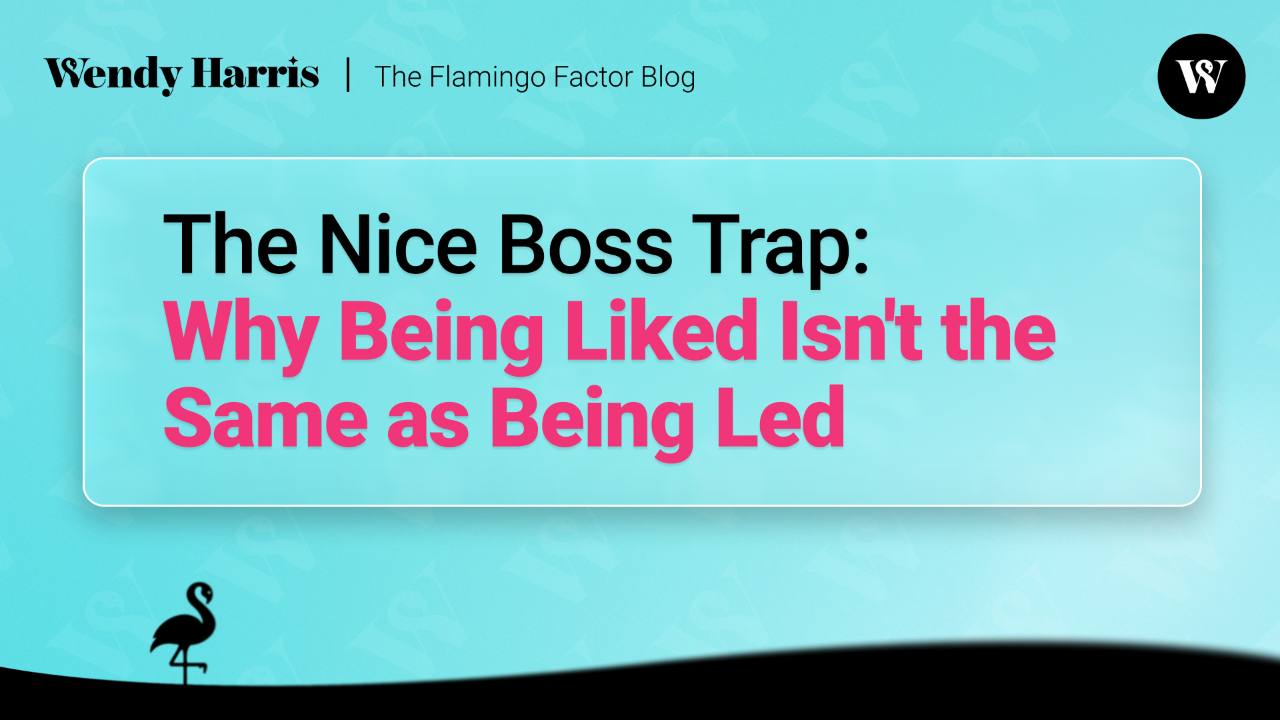The Nice Boss Trap: Why Being Liked Isn't the Same as Being Led
Nov 11, 2025
Your boss brings you coffee, remembers your birthday, and always asks about your weekend. They're lovely, really. Everyone adores them. But when promotion time comes around, somehow your name never quite makes it to the final list. You're starting to wonder if there's a connection.
There is. And it's time we talked about the difference between a boss who's nice to you and a boss who's actually good for you.
The Charm vs. Champion Problem
Nice bosses are everywhere. They're the ones who chat about your holiday photos, sympathise when you're having a rough day, and never raise their voice in meetings. They're genuinely pleasant people, and working for them feels... comfortable.
But comfort isn't career advancement.
The harsh reality is that some of the most career-limiting bosses are also the most likeable. They're brilliant at making you feel valued in the day-to-day, but when it comes to the moments that actually matter eg promotion discussions they go missing in action.
Where Nice Bosses Fall Short
They avoid difficult conversations. Your nice boss won't tell you that your presentation skills need work because they don't want to hurt your feelings. Instead, they'll quietly assign important presentations to someone else, leaving you wondering why you're not getting visibility.
They don't fight for resources. When budget time comes around, they nod along in leadership meetings rather than arguing for headcount or tools their team needs. It's easier to be agreeable than to be the person making demands.
They fail in the promotion room. This is the big one. When senior leadership is discussing who deserves advancement, your nice boss either stays quiet or gives lukewarm endorsements. They're not comfortable being your champion because it might create conflict.
The Backbone Test
Here's how you know if your boss is actually good for your career: do they have the backbone to fight for you in rooms you're not in?
Good bosses are willing to have uncomfortable conversations with their superiors about why you deserve that promotion and that pay rise. They'll push back on unrealistic timelines that would burn out their team. They'll argue for budgets and resources.
This isn't about being confrontational. It's about having the courage to advocate for their people when it matters most.
The Career Cost of Conflict Avoidance
Nice bosses often become nice bosses because they hate conflict. They want everyone to be happy, which sounds lovely in theory but creates real problems in practice.
When your boss won't advocate for you because it might upset someone in leadership, your career stagnates. When they won't give you honest feedback because it's uncomfortable, you don't improve. When they avoid difficult decisions about team priorities, you end up overwhelmed and unfocused.
The irony is that by trying to keep everyone happy, they end up failing the people who actually matter most – their direct reports.
What Good Bosses Actually Do
Good bosses might not always be the most fun to have a drink with, but they'll transform your career. Here's what they do differently:
They give honest feedback. Even when it's uncomfortable. Especially when it's uncomfortable. They tell you what you need to hear, not what you want to hear.
They create opportunities. They don't just wait for opportunities to fall into their lap, they actively look for ways to showcase their people's skills and create advancement paths.
They fight upwards. When senior leadership questions a decision or challenges the team, good bosses defend their people. They take the heat so you don't have to.
They make tough calls. They'll prioritise ruthlessly, say no to unrealistic demands, and make decisions that might upset some people but serve the team's long-term interests.
The Recognition Reality
Your nice boss might tell you you're doing brilliant work, but if they're not telling their boss the same thing, it doesn't matter. Career advancement isn't just about doing good work – it's about having someone in leadership who's willing to stake their reputation on your success.
The best bosses I've worked for weren't necessarily the ones who made me feel warm and fuzzy every day. They were the ones who pushed me, challenged me, and then fought like hell to get me recognised for the results.
How to Spot the Difference
Pay attention to what happens in those crucial moments. When there's a high-visibility project, does your boss put you forward or play it safe with someone more senior? When you express interest in advancement, do they give you concrete steps and timeline, or vague encouragement?
Most importantly, look at their track record. How many people from their team have been promoted? If the answer is "not many," that tells you everything you need to know about their effectiveness as a career champion.
The Bottom Line
Working for someone nice feels good in the short term. Working for someone good transforms your long-term prospects.
The best bosses combine both. They're decent human beings who also have the courage to fight for their people when it matters. But if you had to choose between nice and effective, choose effective every time.
Choose a boss that goes to bat for you in rooms you’re not in.
Don’t Miss Out!
Sign up now to receive Wendy’s “5 Pillars to Make More Money and Accelerate Your Career” training for free. Join the newsletter and discover strategies trusted by top revenue leaders.


